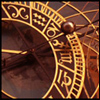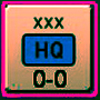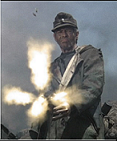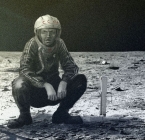Orm
Posts: 22154
Joined: 5/3/2008
From: Sweden
Status: offline

|
quote:
ORIGINAL: warspite1
quote:
ORIGINAL: Gary Childress
quote:
ORIGINAL: warspite1
quote:
ORIGINAL: Gary Childress
quote:
ORIGINAL: warspite1
I just don't think a work of fact and a work of fiction can be looked at in the same way.
And you may be right. But again, unless I'm mistaken, you seem to be saying elsewhere that works of fact and works of fiction should BOTH be equally clear and understandable. As you say above perhaps they are NOT to be looked at in the same way. What is a great work of fact should, under most circumstances, be clear and understandable. What is a great work of literature may have reasons for not being so clear and understandable. One reason is censorship. Sometimes writers may go about something in a convoluted way so as to avoid censorship of a radically new idea.
But now suppose fact and fiction ARE similar in the sense that both make sense to those who are properly initiated to the respective topics. Plato's theory of forms sounds like a lot of bunk to me and probably most modern readers might agree. But his philosophy is still considererd "great" by the amount of influence it had in its own time and by the fact that it entertained questions which up to that point had either been largely ignored or else answered in radically different ways.
I'm simply saying that I am not even close to being an expert on literature and I'm guessing there aren't many others here who are either. But my inclination is to want to find out why Madame Bovary is so great or not before dismissing it as boring and unimportant. I just find it hard to believe that thousands of literary types can be so misled as to think something great which isn't. I wonder if it isn't because we just don't fully understand literature and its contexts. Maybe it's like painting? What makes Monet greater than someone else out there right now who is copying his style even better than he himself could? Yet the copier probably won't go down in history as great an artist as Monet. There are contemporary impressionist painters whom I think paint better than Monet but Monet is famous for being more or less a founder of a style.
PIcasso, OTOH, I can't stand his paintings either. But if I had more context on them, perhaps I could come to like them more.
Warspite1
I gave the painting comparison earlier - there is no context or greater understanding in my personal view that could make me understand or like or even appreciate Picasso and what he was trying to achieve, why he's so great etc etc. I Don't like his paintings, they mean NOTHING to me, are ugly and an eyesore. But someone, somewhere (or more accurately, lots of people) have decreed that Picasso is a genius and his works are worthy of forking out flippin great wadges of cash. Fine, that's up to them, so long as no one forces me to put a Picasso print in my house then that's okay.
But I still think that forcing children to read "classics" is counter-productive. May be it's me - and I am too simple - but I know when I do not like an authors style within the first page. I want to read a story because I want to read a story - I do not want to have to second guess what a writer is trying to say because the narrative is couched in incomprehensible terms!
As far as literary experts are concerned - well I have no idea how many we have on the forum, other than I definitely am not one!!
I agree, Picasso is quite an unbelievable phenomena as far as fame and monetary matters. There's a young girl out there now, I forget her name, but she paints very similar to Picasso yet claims that she had never heard of him nor seen any works by him before adopting her style. I find that hard to believe, considering how similar their work appears. But she has a few pleasing looking paintings out there.
I have seen a few Picasso, wanabees at some art shows and festivals whose paintings I thought were VERY likeable. Picasso's paintings seem often rather blan and ugly in color. But there are some out there who do paint like him but seem to have a better command of color and composition. I have heard that Picasso was present in Spain during the Spanish Civil War and that some of his paintings are more or less reactions to what he witnessed going on in his society around him.
Sometimes knowing the story behind a piece of art makes a difference. Like listening to Strauss' "Zarathustra" after knowing more about Nietzsche makes Strauss' piece more interesting to me. If I knew nothing else about the work I would say it was just elevator music or something. However, having an idea of Neitzsche's life and works I see a pattern to the music and a sense behind why the artist chose a particular mood and such to the piece. The music itself in a strange way seems to mimic the spirit of Neitzsche's life and works as I have come to understand him, at times moments of elation and epiphany at others a sudden sort of melonchaloy and "loneliness" in tone.
Another book I recently "discovered" was Charlotte's Web. I'd read it as a child and didn't get much out of it because no one explained it to me. E.B. White wanted to present the concept of death and loss to children but censorship at the time pretty much forbid the topic from being present in children's books. So White used animals to convey what he wanted to convey. If I hadn't known anything else about White's book I would say it was readble but not very interesting, just another book about animals for children.
Warspite1
I think having something to think about when listening to music can really enhance a piece and the film world is excellent for that. Eternal Father is a stonking piece of music that I have always loved - and have been listening to a lot because of the Military Wives album that I recently downloaded (and they covered this). This piece of music always brings to mind the scene in Crimson Tide when Denzil Washington orders the hatches to be sealed to save the submarine; knowing that in doing so he is condemning a number of sailors to a watery grave. A sad episode that heightens the music experience - ditto Adagio for Strings by Samuel Barber - and the connection to that hideous war called Vietnam.
There is a track by the Russian female duo Tatu. Its called Stars and I have absolutely no idea what they are singing about (the rap element of the song is in Russian and the English bit does not make too much sense). However, in part of the track the choice of instrument used, and tune played, is clearly very Russian in origin. This very melancholy piece always brings to mind the endless Russian Steppe across which, German panzers rolled in the summer of 1942 as the German Army desperately tried (and failed) to encircle Soviet troops - troops that simply melted away into the vast Russian hinterland. All the time, the Landsers were heading unknowingly for a terrible fate; the river Volga and a city that ran along its banks...... Stalingrad.
http://www.youtube.com/watch?v=OvaN1Sx7ucg&feature=fvwrel
Thank you for the music. 
_____________________________
Have a bit more patience with newbies. Of course some of them act dumb -- they're often students, for heaven's sake. - Terry Pratchett
|
 Printable Version
Printable Version


















 New Messages
New Messages No New Messages
No New Messages Hot Topic w/ New Messages
Hot Topic w/ New Messages Hot Topic w/o New Messages
Hot Topic w/o New Messages Locked w/ New Messages
Locked w/ New Messages Locked w/o New Messages
Locked w/o New Messages Post New Thread
Post New Thread